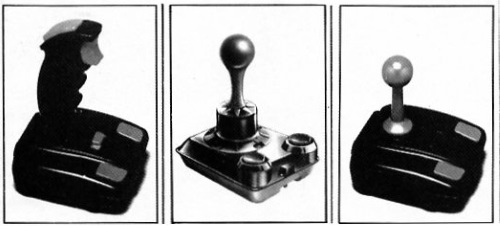WRANGLER
POOR OLD Dave Baxter at Rainbow Arts in Birmingham has been
having a bad old time of it recently. Remember The Great Giana
Sisters, which we gave a CRASH Smash in Issue 55? Well, if you’ve
been scouring the streets for it, stop! It seems that Rainbow Arts are having
a bit of trouble with Nintendo (producers of Super Mario Bros):
‘Nintendo are getting heavy’, says Mr Baxter. And chances of a
Spectrum release are ‘a little bit bleak, to say the least!’. Pity,
just as GO! were starting to get back on the right track again (with
Capcom’s Bionic Commando, Street Fighter and
RA’s TGGS) some big-headed company puts the heavies on them.
And it doesn’t finish there! Rainbow Arts’ next scheduled
release, Katakis, has also had the brakes put on it and will never see
the light of day. Activision reckon it looks a bit too much like
R-Type, and they want all the R-Type buyers to themselves
(greedy sorts). In fact Activision are so worried that somebody might copy the
‘look and feel’ of R-Type that they’ve threatened
anyone who thinks about a clone with legal action. So what does ‘look and
feel’ mean guys? Anyway, it’s just not cricket, is it?
So what scandal is Dave Baxter coming up with for Capcom’s Christmas
release LED Storm? ‘Programmers in eight-year-old virgin
shock!’?
SUM YOU WIN
New budget house Summit is currently offering a ‘collector’s
prize’ of a complete set of old mint-condition coins for the winner of a
free-to-enter competition. The reason for this strange prize? Well, Summit boss
Roger Hulley’s father was the inventor of a popular 1930s card game after which
the company was named. This old game was based on the pre-decimalisation
currency system of pounds, shilling and pence (those were the days — Ed). What
the entrants must try and figure out is how much £2.99 (the price of
Summit games) equates to in ‘old’ money.
AGAIN, AGAIN
IT’S TIME FOR yet another new label from Pontefract-based
Alternative Software. This month heralds the start of Again, Again — their
first full-price label. The lead release will be The Munsters, based on the C4
American TV series (which, fact fiends, has been running for almost nigh on two
decades). Should be out for the end of November.
LICENSED TO SELL
Mediagenic have recently signed a deal with Sega, giving them
exclusive conversion rights to five of the arcade giant’s latest coin-ops.
These are Galaxy Force (a fast 3-D space shoot-em-up in the mould of
Afterburner), Altered Beast (take a look at it in this
month’s arcade feature), Sonic Boom (in which the player pilots a
fighter plane), Hot Rod (surprise, surprise.., yet another driving
game) and Ace Attacker (a volleyball simulation — dig that!). The five
lucrative titles will be divided between Mediagenic’s two labels, Electric
Dreams and Activision, and will all be released during 1989.
Also scheduled for release next year is Mediagenic’s license of the film
Die Hard, starring Bruce Willis as a New York cop trying to rescue a
group of hostages. Meanwhile, Mediagenic are taking the unusual step of using a
national TV campaign to promote their Autumn releases, Afterburner,
SDI and R-Type.
PLAY IT AGAIN, SIM
DIGITAL INTEGRATION have got a new game coming out. And guess
what? It’s a simulator, a flight simulator! Well, with both the directors of DI
originally coming from the Ministry of Defence what more did you expect? It’s
called F-16 Combat Pilot and is very complicated. So now you know!
FAST SINK PIRATES
FAST, THE DILIGENT anti-piracy organisation recently took part
in a raid that seized the largest value of pirated goods to date. Over 3000
counterfeit ST, Amiga and PC software disks worth over £100,000 were
netted when the Glasgow CID conducted the massive raid. Electronic Arts, US
Gold, Elite, Microprose and Ocean were all on hand to help. The enquiries
leading to the seizure took over a year to complete, emphasising the determined
attitude of the whole software industry in stamping out piracy.
THE NAME’S BOND
IN A SURPRISE move, Domark and Elite are jointly releasing the
latest Bond game, Live And Let Die. The reason for this unusual
link-up is due to Domark’s disappointment with their own in-house version of
the licence. After hearing about a speedboat game being developed by Elite
(originally titled Aquablast), they inquired about the possibility of
using this game for the licence. Elite were happy to let Domark market their
game under the lucrative, licensed title and will receive equal billing on the
packaging.
Although both software houses have stressed that this is purely a one-off
deal, Mark Strachan of Domark hinted that there could be future collaboration
between the two firms if this project is exceptionally successful.
BATTLE OF THE JOYSTICKS
BOTH KONIX AND Compumart have announced the arrival of brand-new
joysticks. South Wales-based Konix, the makers of the popular Speed King,
revealed two new desktop joysticks at the recent PC Show. The Predator, which
is likely to retail at just under £13, is slightly larger than its ‘little
brother’ The Megablaster, which should cost under £8. Although the two
sticks appear fairly similar, the main difference between them is internal.
The Predator uses micro-switches while the Megablaster is operated by ‘a more
traditional mechanism’. Both sticks are compatible with all Spectrums,
including the +2s and 3s.
Meanwhile Compumart have the exclusive rights to distribute the Replay Micro
Blaster in the UK. The red and black stick is operated by eight micro-switches
and features a rapid fire option and a steel shaft. Compumart claim that the
Micro Blaster came joint first in an independent survey of 15 leading
joysticks. The stick costs £12.95 and is guaranteed for 12 months.

The Replay Micro Blaster from Compumart is ominously flanked
by Konix’s Predator (left) and Megablaster (right)
POWER HOUSE SHUTDOWN
ASPIRING BUDGET software firm The Power House have mysteriously
gone bust, owing massive debts to their associates. Relations had already
soured between them and their German distributors Ariolasoft after legal
problems.
The Power House label was sold only this February by CRL (who must be
pleased that they got out just in time) to ambitious entrepreneur, Ashley
Hildebrandt and partners. The new owners had hoped to clean up the lacklustre
image of the budget house.
Ironically, only recently Hildebrandt boasted of over quarter of a million
sales since the takeover — the sinking of the firm seems to have tightened his
tongue as he declined to comment on the reasons for the surprising shutdown.
Meanwhile The Power House’s creditors (including Solution PR and duplicator,
Precision Data) are unsurprisingly fuming about the substantial amounts of
money owed to them.
PLAY IT AGAIN, SAM
EXCLUSIVELY REVEALED by CRASH in Issue 50 (all those moons ago),
the long-awaited SAM Spectrum ‘superclone’ is almost ready for release. (I’ll
believe it when I see it! — Ed.) Miles Gordon Technology are set to launch the
new computer at the ZX Microfair in December. Although MGT are based in South
Wales, the SAM will be built in Japan and cost from £100 to £150.
Unfortunately, the Spectrum-compatible machine is unlikely to be
available in high street shops for a while yet but should be available
direct by mail order as soon as February (just like the old Sinclair days
— Ed) — it will be made available first to the members of MGT’s user
groups.
The SAM has been designed by Disciple and Plus D creator Bruce Gordon, and
will come with 256K built-in RAM expandable to 512K. It will also feature a
higher (8 times) colour resolution for its display than the normal Spectrum,
allowing the use of more colour with less attribute clash.
The development of SAM has been financed by the profits from the successful
Plus D disk drive interface, and the new machine’s disk system is based on the
Plus D but will use quad-density 3.5" drives which work twice as fast. Other
built-in ports allow direct connection with MIDI instruments, light pens and
RGB monitors. Also, a built-in networking system (like the old Interface One)
allows SAMs to be connected together for multi-player, multi-computer
games!
Whether this promising ‘clone’ will be able to compete with the marketing
might of Amstrad only time will tell. But for innovation’s sake, let’s hope
that it’s a success.

MGT dealing with more enquiries from anxious readers, who
want to know more about the Spectrum ‘superclone’, SAM
OCEAN IN A SPIN
SCOTTISH TELEVISION, makers of the much-hyped game show
Wheel Of Fortune, recently commissioned Ocean to build a special
version of the coin-op Typhoon to fit into a small suitcase. There was just one
minor problem; Angela Ekaette, the hostess with the mostest who had to
demonstrate the game on the highly intellectual (shurely shome mishtake? — Ed)
TV show, had never played any arcade game before. So young Kane Valentine of
Ocean jumped at the chance to teach Angela how to operate a joystick! To find
out whether Angela can hit the high scores, tune in on Tuesday September 27,
when she will demonstrate the prize worth over £1000 (well I suppose it’s
one reason to watch... yawn).

Would you buy a used joystick from these three?
SOMETHING BEGINNING WITH E
NO IT’S NOT Ed’s car numberplate
— that’s an ‘F’ (as he keeps reminding everyone) — it’s Espionage the
devious board game which Grandslam are converting for all the major formats
including the +3.
The intriguing board game (devised in 1984 but recently rereleased) involves
controlling 12 agents around the board, searching for four microfilms, which
contain the plans for the ‘ultimate weapon’. It’s do or die as spies attack
each other — losing a spy results in a forfeit of your government funds. A
great deal of strategy is involved in using the three different types of agent
to best effect; each type moves in a unique manner.
If the computer version is as fascinating as the excellent board game, we
should be in for a treat.




